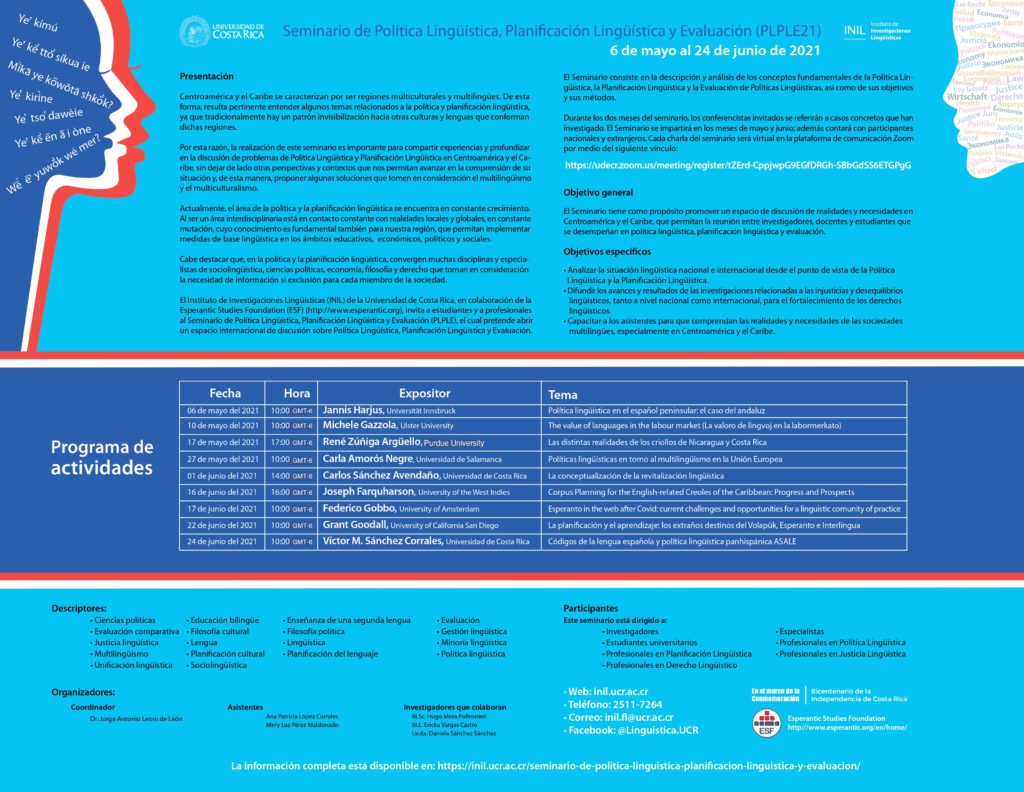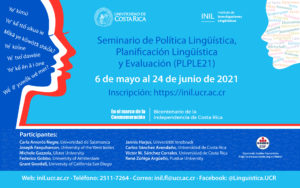Seminar on Linguistic Policy, Language Planning and Evaluation in Central America and the Caribbean: Realities and Needs
Presentation
Central America and the Caribbean are characterized by being multicultural and multilingual regions. Therefore, it is pertinent to understand some issues related to language policy and language planning, since traditionally there is a pattern of invisibility towards other cultures and languages that make up these regions.
For this reason, the realization of this Seminar is important in order to share experiences and deepen the discussion about problems concerning Linguistic Policy and Language Planning in Central America and the Caribbean, without neglecting other perspectives and contexts that allow us to advance in the understanding of their situation and, in this way, propose some solutions that take multilingualism and multiculturalism into consideration.
Currently, the area of linguistic policy and language planning is constantly growing. As it is an interdisciplinary area, it remains in contact with local and global realities, in continuous change, whose knowledge is also essential for our region, allowing the implementation of linguistic-based measures in the educational, economic, political and social fields. It should be noted that, in language policy and language planning, many disciplines and specialists in sociolinguistics, political science, economics, philosophy and law, which take into account the need for information without exclusion for each member of society, converge.
The Institute of Linguistic Research (INIL) of the University of Costa Rica, in collaboration with the Esperantic Studies Foundation (ESF) (http://www.esperantic.org), invites students and professionals to the Seminar on Linguistic Policy, Language Planning and Evaluation (PLPLE), which aims to open an international space for discussion on Linguistic Policy, Language Planning and Evaluation.
The Seminar consists of the description and analysis of the fundamental concepts of Linguistic Policy, Language Planning and Evaluation, as well as its objectives and methods. During the two months of the Seminar, the invited lecturers will refer to specific cases that they have investigated. The Seminar will take place in the months of May and June; it will also have national and foreign participants. Each lecture of the Seminar will be online through the platform for communication Zoom using the following link:
General objective
The purpose of the Seminar is to promote a space for discussion of realities and needs in Central America and the Caribbean, which will allow the meeting between researchers, teachers and students who work in language policy, language planning and evaluation.
Specific objectives
- Analyze the national and international linguistic situation from the point of view of Language Policy and Language Planning.
- Spread the advances and results of research related to linguistic injustices and imbalances, both nationally and internationally, for the strengthening of linguistic rights.
- Train attendees to understand the realities and needs of multilingual societies, especially in Central America and the Caribbean.
Speakers Profile
Ph.D. Carla Amorós Negre, University of Salamanca, Spain. Researcher on language policy and planning, linguistic and sociolinguistic prescription and standardization. She is the author of three monographs: Norma y estandarización (2008) –Norm and Standardization-, Las lenguas en la sociedad (2014) –Languages in Society– y La estandarización lingüística de los relativos en el mundo hispánico. Una aproximación empírica (2018) -linguistic Standardization of Relatives in the Hispanic World-.
Web: http://www.aesla.org.es/es/user/carlitausales
PhD. Joseph Faquharson, University of the West Indies, Jamaica. Full professor in the Department of Language, Linguistics and Philosophy at the University of the West Indies. His research areas include descriptive linguistics of Caribbean languages, lexicography, morphology, anthropological linguistics, and cultural studies. Some of his publications are Sung speech acts: Towards an analysis of participant roles in Jamaican dancehall music (2017) and Linguistic ideologies and the historical development of language use patterns in Jamaican music (2017).
Web: https://www.mona.uwi.edu/humed/staff/joseph-t-farquharson
Ph.D. Michele Gazzola, University of Ulster, UK. His research areas include public policy, language policy and planning, language economics, and multilingualism as a social phenomenon. He has been part of important projects such as MIME (Mobility and Inclusion in a Multilingual Europe) at the Faculty of Humanities and Social Sciences of the Humboldt University of Berlin and LAPO (Language Policy and Linguistic Justice in the European Union) at the Institute of Public Economy from the Humboldt University of Berlin.
Web: https://www.michelegazzola.com
PhD. Federico Gobbo, University of Amsterdam, Amsterdam. His research interests and teaching experience include the areas of Linguistics, Philosophy and Computing. In particular, he focuses on artificiality in languages. Here the concept of ‘languages’ refers to those that have been planned as international auxiliary languages, for example, Esperanto and Volapük; he is also inclined to languages planned for fictitious purposes such as the Klingon from Star Trek. Moreover, he commits himself to the issues of multilingualism and language policy and planning.
Web: https://www.uva.nl/en/profile/g/o/f.gobbo/f.gobbo.html
Ph.D. Grant Goodall, University of California, San Diego, USA, directs the Experimental Syntax Laboratory and the Linguistic Language Program. Researcher on syntax and its interaction with cognitive processes. Author of the book Parallel Structures in Syntax: Coordination, Causatives, and Restructuring, 2009, Cambridge: Cambridge University Press and author of the textbook with Darcy Lear, Conéctate: Introductory Spanish, 2015, Ohio: McGraw Hill Education.
Web: http://ling.ucsd.edu/people/faculty/profiles/GrantGoodall.html
PhD. Jannis Harjus, Universität Innsbruck, Austria. He currently works at the Institute of Romance Studies at the University of Innsbruck. In 2016 he obtained his PhD. (summa cum laude) with his thesis The Andalusian Sociolinguistic and Perceptual Linguistic of Variation: the Spanish spoken in Jerez de la Frontera.
Web: https://www.uibk.ac.at/romanistik/personal/harjus/
Ph.D. Carlos Sánchez Avendaño, University of Costa Rica. Full professor of Linguistics and specialist in working with Languages in displacement process. Author of the book La cola de la iguana: The Malecu people facing the displacement of their language and their traditional culture, 2015, Costa Rica: Editorial Universidad de Costa Rica and of the article “Los malecus contra Cristóbal Colón: anachronism or retraditionalization?”, in Káñina: Magazine of Arts and Letters of the University of Costa Rica, 2020.
Web: https://filologia.ucr.ac.cr/personal/docentes/carlos-sanchez-avendano/
Ph.D. Víctor Manuel Sánchez Corrales, University of Costa Rica. Full professor of Linguistics, specialist in Romanistics and creator of the Research Program of Hispano-Costa Rican Lexicography Studies (ELEXHICÓS). With this work, several dictionaries have been created, and he has developed more than 55 research studies in various fields of Philology.
Web: https://www.cu.ucr.ac.cr/cu/historia/ex-director/Accion/show/ExDirector/victor-manuel-sanchez-corrales.html
M.L. René Zúñiga Argüello, Purdue University. In 2013 he completed the Academic Master’s Degree in Linguistics with the thesis Relative Clauses in Limonense Creole. His research interests include Pidgins and Creole languages, predicates in motion in Central American Creoles, syntax, and language revitalization.
Web: https://cla.purdue.edu/directory/profiles/rene-zuniga-arguello.html
Descriptors
- Political Sciences
- Bilingual education
- Teaching a second language
- Evaluation
- Comparative evaluation
- Cultural philosophy
- Political philosophy
- Linguistic management
- Linguistic justice
- Language
- Linguistics
- Linguistic minority
- Multilingualism
- Cultural planning
- Language planning
- Linguistic policy
- Linguistic unification
- Sociolinguistics
Participants
This seminar is addressed to:
- Researchers
- Specialists
- University students
- Professionals in Language Policy
- Professionals in Language Planning
- Professionals in Linguistic Justice
- Professionals in Language Law
Organizers
Coordinator
- Dr. Jorge Antonio Leoni de León
Assistants
- Ana Patricia López Corrales
- Mery Luz Pérez Maldonado
Collaborating researchers
- M.Sc. Hugo Mora Poltronieri
- M.L. Ericka Vargas Castro
- Licda. Daniela Sanchez Sanchez
Note: This Seminar is registered in the Vice-rectory of Research (Vicerrectoría de Investigación), code 745-C0-713 (https://vinv.ucr.ac.cr/sigpro/web/projects/C0713), and has the support of the Institute of Linguistic Research (INIL), the Vice-rectory of Research (Vicerrectoría de Investigación) (http://www.vinv.ucr.ac.cr/), the Postgraduate Program in Linguistics (https://www.sep.ucr.ac.cr/index.php?option=com_sppagebuilder&view=page&id=26), the Graduate Studies System (SEP, http://www.sep.ucr.ac.cr/) and the Esperantic Studies Foundation (ESF, http://www.esperantic.org/).
Lectures

| Title | Kerwá | YouTube |
|
Zúñiga Argüello, René Las distintas realidades de los criollos de Nicaragua y Costa Rica [The Different Realities of the Creoles of Nicaragua and Costa Rica) 17/05/2021 |
http://hdl.handle.net/10669/83701 | https://youtu.be/-6-R4i0Wx-I |
|
Amorós Negre, Carla Políticas lingüísticas en torno al multilingüismo en la Unión Europea [Language Policies about Multilingualism in the European Union] 27/05/2021 |
http://hdl.handle.net/10669/83700 | https://youtu.be/GHf05zDzgng |
|
Sánchez Avendaño, Carlos La conceptualización de la revitalización lingüística [The Conceptualization of Linguistic Revitalization] 01/06/2021 |
http://hdl.handle.net/10669/83657 | https://youtu.be/LF49nFDJ4pc |
|
Federico Gobbo Esperanto in the web after Covid: current challenges and opportunities for a linguistic community of practice 17/06/2021 |
http://hdl.handle.net/10669/83766 | https://youtu.be/joAONthacMk |
|
Grant Goodall La planificación y el aprendizaje: los extraños destinos del Volapük, Esperanto e Interlingua [Planning and learning: the strange fates of Volapük, Esperanto and Interlingua] 22/06/2021 |
http://hdl.handle.net/10669/83780 | https://youtu.be/-7FYiAAqwRk |
|
Vívtor Manuel Sánchez Corrales Códigos de la lengua española y política lingüística panhispánica ASALE [Spanish Language Codes and pan-Hispanic Language Policy ASALE] 24/06/2021 |
http://hdl.handle.net/10669/83798 | https://youtu.be/vAC5ad1iSVo |



